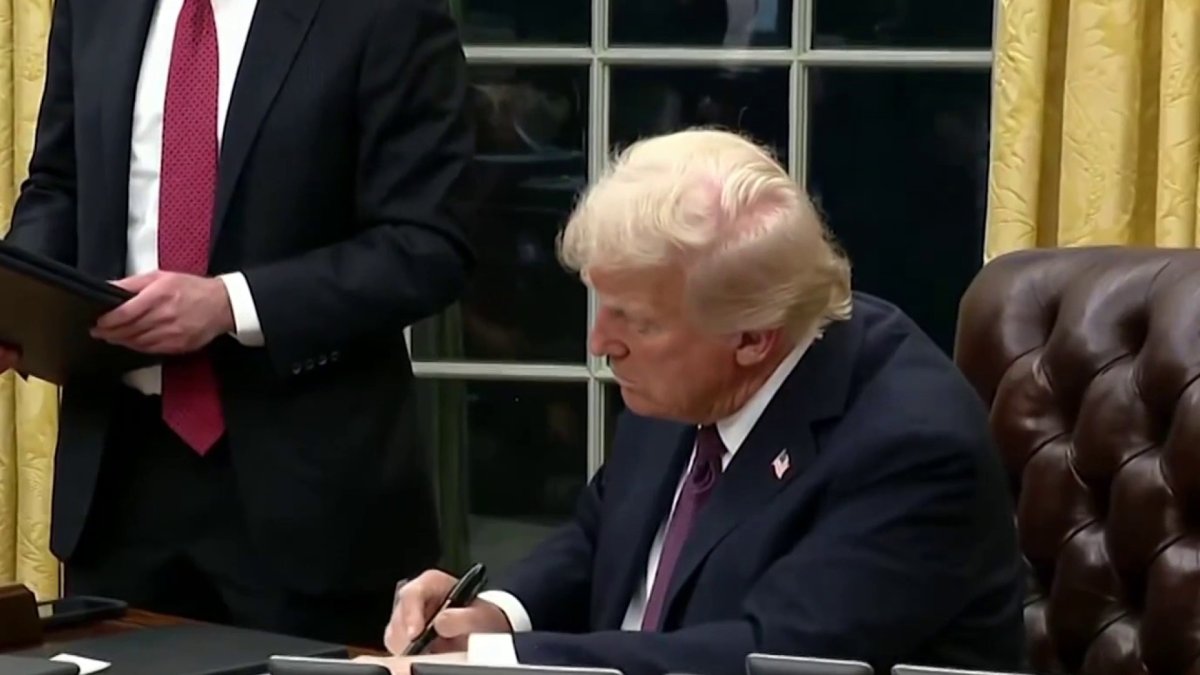DEI, Project 2025 and the Constitution: Tracking Trump's impact in his first 100 days

The tidal wave of President Donald Trump’s executive orders ripped through the federal government within hours of his inauguration. He established the Department of Government Efficiency, took aim at federal workers and protections for the transgender community, and pardoned Americans convicted of attacking the U.S. Capitol on his behalf. As Trump reaches 100 days in office this week the impact of his second term is already profound. The News4 I-Team sat down with key players and observers to better understand Trump’s legacy so far and what it means for the Americans he serves. “Donald Trump campaigned by saying what he wanted to do, but not how he was going to do it. We're now getting into the weeds and the details, and the devil's always in the details,” said presidential historian and author Todd Belt. He said Trump has acted with historic force and speed. “Everybody expected him to move fast, but to see 75 executive orders within the first few days was absolutely tremendous,” Belt said. Trump’s executive order stripping diversity, equity and inclusion (DEI) efforts from the federal government and beyond has had particular impact. Its effects on federal workers were immediate and still ripple through corporate America. “Donald Trump knew that DEI and some of the social issues that he ran on were a key issue for him that he could do things on. But nobody thought it was going to be as broad as cutting funding to universities and just the wholesale strong-arming of American corporations on the issue of DEI,” Belt said. Trump’s actions and Project 2025 Measuring a president’s first 100 days began with President Franklin Delano Roosevelt, who coined the term as a way to measure his own progress in office. Comparing Trump’s first 100 days in this term to his prior term, he signed five bills in this term and 28 at this point in his last term. But he’s issued a sizable number of executive orders during his second time in the Oval Office. Within Trump's over 140 executive orders so far this term have been some of the policies recommended in Project 2025, the Heritage Foundation's plan for a conservative administration like Trump's. On the campaign trail, Trump disavowed any connection to the initiative, but Russell Vought, its lead author, now directs the U.S. Office of Management and Budget. Project 2025 plans that have been implemented include ending DEI policies, stripping civil servants of key job protections and gutting the Department of Education. A Maryland Democrat pushes back “Every day you feel like you're waking up to a natural disaster—that sense of urgency, like, ‘Oh, what's next? What happened last night? What's going to happen before 10 o'clock this morning?’” said Maryland Attorney General Anthony Brown, describing how life has changed since Trump returned to the Oval Office. Within 24 hours of Trump being sworn in, Brown filed his first of roughly a dozen lawsuits against the administration. His office has joined with largely Democratic-led state attorneys general from across the country to challenge many of Trump's policies in court. “He is challenging constitutional principles, constitutional authorities and powers. So, our lawsuits are calling him out for just that,” Brown said. Brown signed onto a lawsuit opposing Trump's executive order attempting to limit birthright citizenship; the legal case soon heads to the Supreme Court. Another demanded thousands of fired probationary federal workers get their jobs back but has so far not prevailed in court. “The fundamental question that these lawsuits present is really, how strong is our democracy? What does the rule of law mean?” Brown asked. Despite the legal challenges to many of his orders, Trump’s job approval rating is about 45%, according to Gallup poll data, compared to 41% at this point in 2017 ‘Are we seeing very good ideas being implemented?’ Horace Cooper, with the conservative National Center for Public Policy Research, questioned the effectiveness of holding up Trump's agenda in the courts. “They litigated. They can't help themselves. The left can't help themselves,” he said. “This has been a very, very bad strategy called ‘everything Donald Trump does, I must reflexively oppose.’ And by doing so, they are creating the very circumstances that they say they fear,” Cooper continued. He said it doesn’t matter whether Trump’s policies were outlined in Project 2025. “The better question is, are we seeing very good ideas being implemented?” Cooper asked. He said he’s happy with Trump’s first 100 days, particularly when it comes to deregulation. But he said he wants to see more in reducing the national debt. He expects additional cuts to the federal government and suggests federal workers prepare. “Particularly to Black America, work in government is a terrible strategy. Eventually, we won't be able to afford this. Get out now, while the opportunity is great to be in the marketplace,” Cooper said. ‘He is testing the Constitution’ In the past 100 days, the path of Trump’s presidency has conjured terms like ‘constitutional crisis’ and debates over whether the U.S. is now in one. Brown, Maryland’s attorney general, said he does not believe that’s the case. “We're not in a constitutional crisis at this point, no. He is testing the Constitution. The Constitution is still strong,” he said. Belt, the historian, said he believes Trump’s clashing with the courts will play a critical role in his legacy and democracy as Americans know it. “We're at a real precipice right here. Right now, if the president is going to ignore the courts – he’s already started attacking them – but if he ignores them, that is a serious constitutional crisis,” he said. In a statement, White House press secretary Karoline Leavitt said: “The next 100 days will consist of trade deals, peace deals, and tax cuts. More American greatness is on the way.”


















